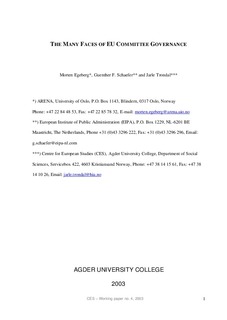| dc.contributor.author | Egeberg, Morten | |
| dc.contributor.author | Trondal, Jarle | |
| dc.contributor.author | Schaefer, Guenther F | |
| dc.date.accessioned | 2012-05-07T07:26:57Z | |
| dc.date.available | 2012-05-07T07:26:57Z | |
| dc.date.issued | 2003 | |
| dc.identifier.issn | 1503-3724 | |
| dc.identifier.uri | http://hdl.handle.net/11250/134873 | |
| dc.description.abstract | Committees linking national administrations and the EU level play a crucial role at all stages
of the EU policy process. The literature tends to portray this group system as a coherent mass,
characterised by expert-oriented ‘deliberative supranationalism’, a term developed through
studies of comitology (implementation) committees. This article builds on survey data on 218
national officials in 14 Member States who have attended EU committee meetings. We show
that these groups do indeed exhibit important common features. Firstly, expert knowledge
rather than country size plays a pivotal role in the decision making process. Secondly, across
types of committee, participants evoke multiple allegiances and identities. Although loyalty to
various national institutions is most frequently expressed, a considerable proportion also has a
sense of belonging to the committees as such. However, we also demonstrate that there is
significant variation among types of committee. Council and comitology groups both display
behavioural patterns that are strongly intergovernmental in character, while Commission
committees seem more multi-faceted in this respect. Although our primary aim here is to give
a unique empirical account, our main observations are interpreted from an institutional and
organisational perspective. | no_NO |
| dc.language.iso | eng | no_NO |
| dc.publisher | Centre for European Studies, Agder University College | no_NO |
| dc.relation.ispartofseries | CES Working Papers;2003:4 | |
| dc.title | The many faces of EU committee governance | no_NO |
| dc.type | Working paper | no_NO |
| dc.subject.nsi | VDP::Social science: 200::Political science and organizational theory: 240 | no_NO |
| dc.source.pagenumber | 33 p. | no_NO |
